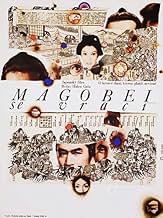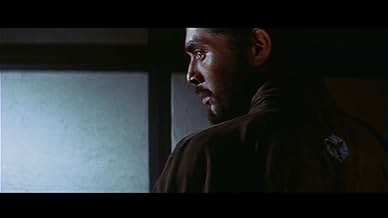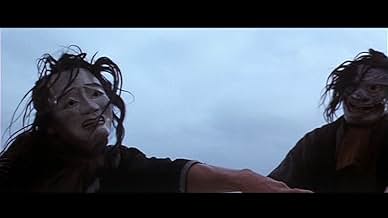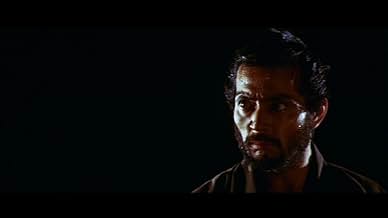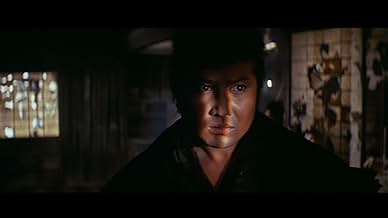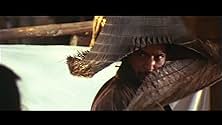IMDb-BEWERTUNG
7,6/10
2761
IHRE BEWERTUNG
Ein von Schuldgefühlen geplagter Samurai-Krieger versucht, ein stattfindendes Massaker zu verhindern.Ein von Schuldgefühlen geplagter Samurai-Krieger versucht, ein stattfindendes Massaker zu verhindern.Ein von Schuldgefühlen geplagter Samurai-Krieger versucht, ein stattfindendes Massaker zu verhindern.
- Auszeichnungen
- 2 Gewinne & 1 Nominierung insgesamt
Empfohlene Bewertungen
After reading all the raves about this movie I was looking forward to finally watching it. I have to admit to being somewhat let down. Mind you it is a good movie with Nakadai putting in a great performance as a haunted samurai. Maybe I have seen too many samurai or movies from the east but the story seems formulaic for me (I am also watching it over 40yrs since it was made and the movie is older then I am). I still give this movie a 7 rating as it is a good movie but there definitely are better ones. Note: I watched Goyokin after The Sword of Doom. Nakadai's performance is better in this movie but I enjoyed The Sword of Doom more as a whole.
Goyokin is a hauntingly beautiful story of a Magobei Wakazaka a samurai turned to a drunk guilt ridden ronin after taking part in the slaughter of some innocent people because he was following orders from his brother in law in a plot to steal some official gold (Goyokin). When his brother in law decides to steal more gold and kill more people some assassins come for Magobei to silence him forever. This causes Magobei to throw down the bottle of sake and take up the sword once again. He decides to journey back to stop the slaughter and seek redemption.Gosha tells the classic story of a samurai and his giri-ninjo conflict, that is his struggle against following orders which is the way of the samurai, or doing what he believes is right. He uses his trademark crows as symbolic supernatural supervisors of karma and in such a way it eerily beautiful and unforgettable.
I saw this film in the late 1970s. It was called "Goyekin - The Emperor's Gold". As I watched our guilt-ridden hero return to fulfill his promise, really a threat, to punish his family if they repeated their crime. I still see the image of him striding along the beach with a conical hat pulled low. The shadow on his face made his eyes glow under the hat and the shot was taken with a telephoto through wispy beach grass. Completely memorable. Then the scene in the forest with the horsemen riding through. It looked like an ancient Japanese painting with hazy colors and an other-worldliness that was amazing. Then the concluding duel in the snow. Two brilliantly attired samurai dueling in a pure white, glistening environment. So many great images from one film!
The film itself is a pretty typical revenge film with some twists. When Tom Laughlin tried to redo it as a Mexican western,"The Master Gunfighter", it just fell flat. But the samurai movie has an entertaining plot and good action characters with beautiful settings. I think this film is a special case of cinematographic excellence. See it and enjoy the beauty.
The film itself is a pretty typical revenge film with some twists. When Tom Laughlin tried to redo it as a Mexican western,"The Master Gunfighter", it just fell flat. But the samurai movie has an entertaining plot and good action characters with beautiful settings. I think this film is a special case of cinematographic excellence. See it and enjoy the beauty.
I saw "Goyokin" in 1969 at a small theater in Yokohama, Japan. It was in Japanese, of course, but the evolution of the story was understood. The film was so well done, and beyond what I was used to as an American watching Japanese movies in Japan. The acting was superb and the tension was palpable. The story was unique and its presentation was gorgeous. It's not hyperbole to say I was awestruck. With the advent of VHS I began searching for this movie as a video. After years of searching, I bought a barely watchable re-re-re-reprint with multiple subtitles. I was happy to HEAR the movie again! Tom ("Billy Jack") Loughlin made the putrid, displaced "The Master Gunfighter" but it was ludicrous as a Western. I will never understand why this classic has not been produced as a Video! Obviously, many people know about it, and it appears on wish lists throughout the world. It deserves the full DVD treatment and, PLEASE, while the great Tatsuya Nakadai is still alive to provide commentary on it.
From the truly creepy opening to the climax, this movie holds your attention, both with its cinematography and (more preciously) a gripping and coherent storyline.
Excellent filming techniques in this film hold your attention, when the suspense (yes! actual suspense!) doesn't. The acting (by Nakadai Tatsuya, one of Japan's greatest actors -- far better than Mifune Toshiro, IMHO) is top notch. Finally, the violence (though there's plenty) never degenerates into splatter. The violence appears much more disturbing (intentionally so) and much less titillating than in many "chambara" movies.
Also noteworthy, this movie plays on the "loyalty vs. morality" theme that Gosha seems so fond of hammering. In this particular movie, however, he really pulls it off with some intelligence. Though I'm a big fan of Gosha, I have to admit that not everything he touches turns to "gold" (Get it? You will...).
Even so, if you're going to sample from the "chambara" genre, this is among the best (my other nominee would be "Hitokiri/Tenchu" (1969). Frankly, I think it's among the best Japanese films, period.
Excellent filming techniques in this film hold your attention, when the suspense (yes! actual suspense!) doesn't. The acting (by Nakadai Tatsuya, one of Japan's greatest actors -- far better than Mifune Toshiro, IMHO) is top notch. Finally, the violence (though there's plenty) never degenerates into splatter. The violence appears much more disturbing (intentionally so) and much less titillating than in many "chambara" movies.
Also noteworthy, this movie plays on the "loyalty vs. morality" theme that Gosha seems so fond of hammering. In this particular movie, however, he really pulls it off with some intelligence. Though I'm a big fan of Gosha, I have to admit that not everything he touches turns to "gold" (Get it? You will...).
Even so, if you're going to sample from the "chambara" genre, this is among the best (my other nominee would be "Hitokiri/Tenchu" (1969). Frankly, I think it's among the best Japanese films, period.
Wusstest du schon
- WissenswertesThis is the first Japanese feature film in Panavision.
- VerbindungenFeatured in Trailer Trauma V: 70s Action Attack! (2020)
Top-Auswahl
Melde dich zum Bewerten an und greife auf die Watchlist für personalisierte Empfehlungen zu.
- How long is The Steel Edge of Revenge?Powered by Alexa
Details
- Laufzeit2 Stunden 4 Minuten
- Sound-Mix
- Seitenverhältnis
- 2.35 : 1
Zu dieser Seite beitragen
Bearbeitung vorschlagen oder fehlenden Inhalt hinzufügen


